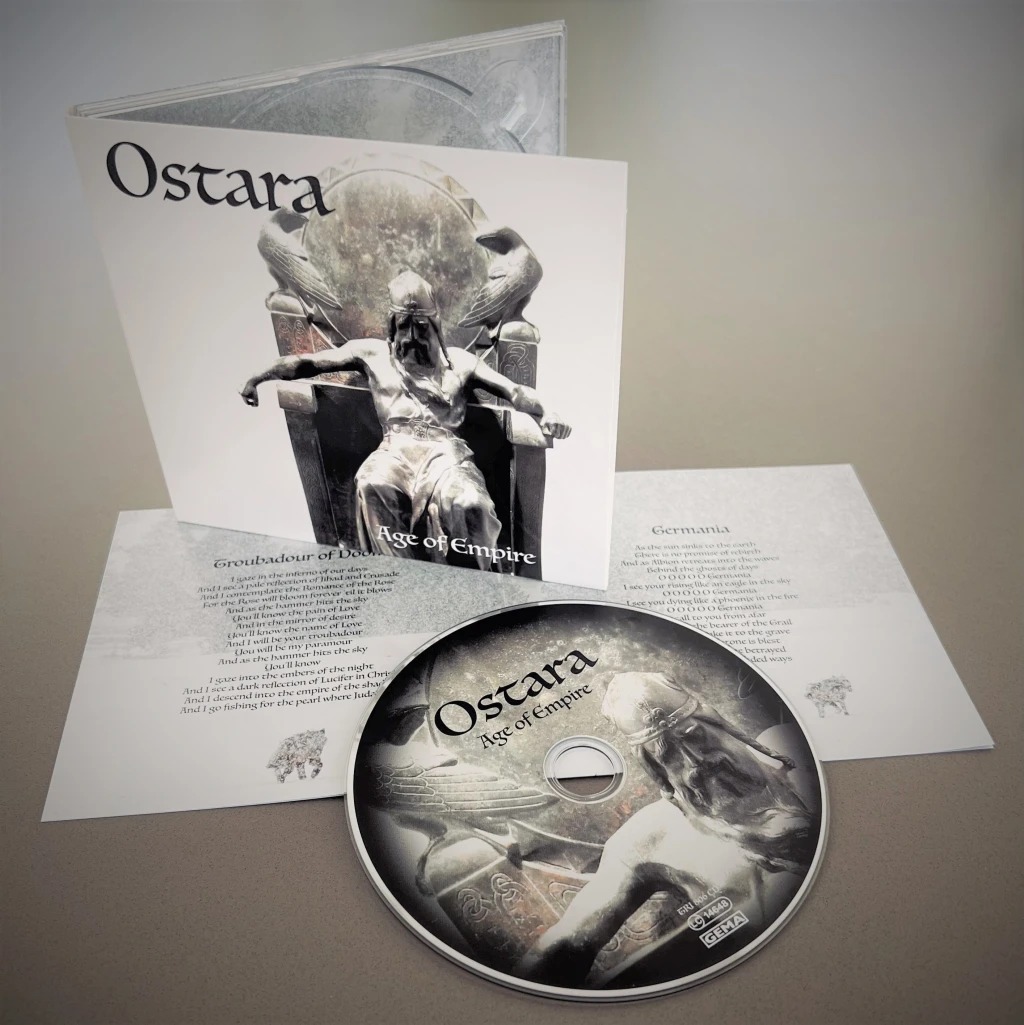
John Wisniewski is a writer who resides in New York. He has written for LA Review of Books, AMFM Magazine, Toronto Review of Books, and other publications.
1. Richard, when did you form Ostara and what was the concept for the band?
It was late 1999. I was looking for a new moniker to replace my first project, Strength Through Joy. The name Ostara appealed to me in a very immediate way, but I wanted to detach it from its ethereal New Age associations, embrace its deeper archaic roots, and communicate something mysterious, steeped in the esoteric resonance of its origins in Occidental lore and history. It is very much part of that late Romantic revival that erupted at the endo of the 19th Century and shaped so much of the aesthetics and poetics of the time, a revolt against Rationalism and Materialism, embracing Nature and the quest for the numinous. After so many years, I no longer really question why I adopted it. It’s more like it has adopted me and I am just its messenger.
2. Any favorite music artists? Particularly in British folk?
In terms of British folk, I am a fan of Steeleye Span, Fairport Convention, Nick Drake, Jethro Tull, and some of the English folk-inspired songs of Led Zeppelin. I also like the classical side of English music, especially Bird, Tallis and Taverner.
3. When did you become interested in the occult arts?
I am not a formal practitioner of the occult but see art and music as an expression of the hidden layers of being through which it manifests itself through word, image, sound. It’s not simply an arcane phenomenon relegated to the ancient past, but something perennial and constant, accessible to those who are responsive to the elemental and primordial truths that are expressed in non-rational ways. I recall something Crowley said about the power of Magick in everything, even the everyday world, and am cognisant of what Jung called synchronicity and the psychological dimension of the spirit. If you see the world in these terms you begin to realise that everything happens on an occult plane and that some see it and others are blind to it, while some embody it in more profoundly unconscious ways, not necessarily through the lens of a particular tradition, but directly and intuitively. It’s like one of those weird signals you can pick up through a short wave radio, except its within and not just beyond us.
4. What inspires you to write music?
It remains a mystery. I think it’s just intrinsic to who and what I am. At heart, I’m a poet who happens to compose songs but since poetry and music are synonymous and originate from the same source, there’s a symbiosis between lyrics and music and the way they are arranged and performed. It’s an immersive experience and I am increasingly aware of being compelled to channel what’s happening around me, not just my firsthand experiences and perceptions but how they relate to the world at large in which past, present and future are locked in a fateful tryst.
5. What was it like collaborating with Death in June?
In a nutshell, a dream come true. It’s rare that one meets an idol let alone gets to work with them and become part of their world. It’s a cliche now to say that he is the ‘godfather of Neofolk’ but it’s patently true, although that label came long after we started collaborating. I learnt a great deal from him how to record, produce, perform and embody the music you create, the last being the hardest as it’s a marathon with hurdles. What stands out for me is not just the sheer dedication, boundless energy and dogged determination but a very infectious sense of humour that made it so special to be around him. We did two tours together with Boyd Rice / NON and they were among the wildest and most memorable experiences of my life. Picture a van with a trailer full of instruments spinning 360 degrees on ice outside of Denver, playing in the dark through an electrical blackout during a show in Lisbon, and on a fire escape after a show was cancelled in Kassel while police with dogs patrolled the premises. There was never a dull moment on those tours because you never knew what was round the corner. It was and still is always about seeing it through to the last, never relenting, never apologizing for who and what you are, having a keen sense of irony, wit and schadenfreude, while being very generous to those who support you because it is nothing short of devotion. Although I rarely see him these days, when I do, it’s like yesterday all over again.
6. Tell us about your band, before Ostara, Strength Through Joy?
This was myself and Timothy Jenn who I met in Adelaide, Australia at a history course on Germany. He was from Dublin and a fan of Joy Division. I introduced him to Death in June and we recorded a demo in what was barely a home studio back then (guitar, mike and keyboard plugged into a stereo system and printed to cassette). We sent it to Douglas P. in the UK only to discover he was residing not far away from us! Pure coincidence or synchronicity? I like to think it was both. One thing he shared with us was that the music we were making was not another DiJ clone but something unique and I always took that to heart. We recorded two albums, The Force of Truth and Lies and Salute to Light, both of which still attract interest to the point of constant requests to reissue and perform. That is gratifying as it reminds me that what we started had value even though I know I can’t go back to that time. Ostara is the more refined and mature heir, and when Timothy left in 2002, I had to continue what we had started. But I still look back with nostalgia and with every new endeavour I know I carry those seminal years inside me. It’s that emergent and volatile expression of the spirit of youth that lights a spark, burns fast, but without which there is nothing to inherit.
7. Tell us about making the new album, Richard?
It has been three years in the making, emerging from the blur of Covid and completed a month after the invasion of Ukraine. It was recorded while lockdowns were still in force across much of the world, so there was a sense of urgency, a sort of bunker mentality coupled with a strange feeling of calm. At times it was so quiet that all you could hear were the singing of birds, some of which crept into the recordings and are audible in places. It seemed as if the world was spiralling into collective hysteria, paranoia and cognitive dissonance, so it was unavoidable that this would influence the process and force some kind of reckoning. Those who have heard it are saying it’s the most accomplished Ostara album thus far and I am ever more mindful of the importance of speaking truth, not just to power, but to life itself. It’s not about being didactic or moralistic. It’s about seeing behind the sordid veil of the Zeitgeist and deciphering the present in the light of the past because nothing escapes the shadow and most of history is a form of re-enactment, the same characters with different masks wearing different costumes but playing the same roles in different guises, unaware of the strings attached to their hands. Nothing new under the sun is a phrase that comes to mind. It really has all happened before. Only the scenery and the props are different.
8. What was the concept behind the album?
 “Age of Empire” is a reaction to the decline of empires that unleashes a nostalgia for empire, a longing to return to a purity of form and spirit that is a symptom of a modern malaise. It has led to the resurgence of nationalism in Europe, of imperialism in Russia, and of reactionary conservatism in America. These are monumental forces that are currently engaged in a struggle against the liberal democratic order, which is in truth just another form of empire that has weakened its grip on much of the world. It is a volatile tectonic shift from the optimism that followed the end of the last Century to a more fractured reality in which there is no equilibrium, no ‘end of time’ and no universal truth. Old ideas of identity are being resurrected, all competing for the hearts and minds of peoples whose spiritual experience is fractured by materialism and globalisation. This Age of Empire is quite different from what preceded it because it was conceived in modernity and is very much part of the rift within modernity where alternative sources of truth are available to anyone with an internet connection. We are all caught up in this web of alternate realities where virtual realms are creating new ways to influence the world and make history by proxy It’s the petty imperialism of the ego that is mirrored in the likes of Trump, who is the personification of egocentrism, a god-like troll invested with the millenarian cult of a saviour. How far this is from the religious wars of the Reformation or the period after the collapse of the Roman Empire is only a question of degree. The yearning for deliverance and certainty reflects an intolerable absence and the impossibility of redemption.
“Age of Empire” is a reaction to the decline of empires that unleashes a nostalgia for empire, a longing to return to a purity of form and spirit that is a symptom of a modern malaise. It has led to the resurgence of nationalism in Europe, of imperialism in Russia, and of reactionary conservatism in America. These are monumental forces that are currently engaged in a struggle against the liberal democratic order, which is in truth just another form of empire that has weakened its grip on much of the world. It is a volatile tectonic shift from the optimism that followed the end of the last Century to a more fractured reality in which there is no equilibrium, no ‘end of time’ and no universal truth. Old ideas of identity are being resurrected, all competing for the hearts and minds of peoples whose spiritual experience is fractured by materialism and globalisation. This Age of Empire is quite different from what preceded it because it was conceived in modernity and is very much part of the rift within modernity where alternative sources of truth are available to anyone with an internet connection. We are all caught up in this web of alternate realities where virtual realms are creating new ways to influence the world and make history by proxy It’s the petty imperialism of the ego that is mirrored in the likes of Trump, who is the personification of egocentrism, a god-like troll invested with the millenarian cult of a saviour. How far this is from the religious wars of the Reformation or the period after the collapse of the Roman Empire is only a question of degree. The yearning for deliverance and certainty reflects an intolerable absence and the impossibility of redemption.

